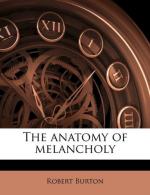|
This section contains 7,073 words (approx. 24 pages at 300 words per page) |

|
SOURCE: Gardiner, Judith Kegan. “Elizabethan Psychology and Burton's Anatomy of Melancholy.” Journal of the History of Ideas 38, No. 3 (July-September 1977): 373-88.
In the essay below, Gardiner explores the dimensions of Burton's psychological method in The Anatomy of Melancholy, concluding that “Burton digests his medieval and Renaissance science and other material available to him to create a humanistic psychology that is both comprehensive and reasonably coherent.”
In 1946 Louise C. Turner Forest wrote “A Caveat …” to warn against the dangers of applying Elizabethan psychology to literary characters. The psychological tracts of the English Renaissance were “a chaotic jumble of ambiguous or contradictory fact and theory,” often more physiological than psychological. Forest concluded that Elizabethan psychology did not exist as a coherent body of belief. Contemporary dramatists could choose illustrations at will from bits and pieces of outmoded medieval scientific “facts” or from “vague general notions” or personal observations.1 Like the bumblebee...
|
This section contains 7,073 words (approx. 24 pages at 300 words per page) |

|


